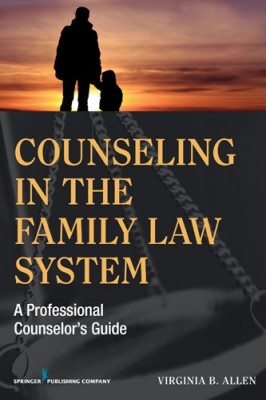 When most experts in a field state that they “wrote the book” on a topic, it is merely a complimentary figure of speech; however, Dr. Virginia B. Allen has literally written the book on professional counselors working within the legal system. Drawing on more than 20 years of experience as a professional counselor working within the family court system, Dr. Allen has developed a comprehensive review of the field of forensic counseling titled Counseling in the Family Law System: A Professional Counselor’s Guide. At first glance, I thought this book would detail how counselors could collaborate with other professionals working within the legal system to advocate for clients, but that impression was only partially correct. I did not realize that professional counselors could play an integral role within the family court system as advocates for children and evaluators in custody suits, work as mediators between aggrieved parties, and operate as case managers within the judicial system.
When most experts in a field state that they “wrote the book” on a topic, it is merely a complimentary figure of speech; however, Dr. Virginia B. Allen has literally written the book on professional counselors working within the legal system. Drawing on more than 20 years of experience as a professional counselor working within the family court system, Dr. Allen has developed a comprehensive review of the field of forensic counseling titled Counseling in the Family Law System: A Professional Counselor’s Guide. At first glance, I thought this book would detail how counselors could collaborate with other professionals working within the legal system to advocate for clients, but that impression was only partially correct. I did not realize that professional counselors could play an integral role within the family court system as advocates for children and evaluators in custody suits, work as mediators between aggrieved parties, and operate as case managers within the judicial system.
In the first part of the guide, Dr. Allen explores the foundations of forensic counseling and the family law system, defining forensic counseling and providing a greater understanding of legal terminology and the various functions that professional counselors can perform in this venue. She works to dispel many myths associated with working in the family law courts, and also highlights the realities of these positions. As with any area of specialization in the counseling field, it is important to understand the scope of practice for such work, and Dr. Allen clearly outlines the types of training needed to prepare for this area of counseling. Likewise, she discusses ethical considerations for the positions of case managers, mediators and custody evaluators. Additionally, she explores the standards of practice outlined by the Association of Family and Conciliation Courts.
The second part of the book focuses on the basics of counseling practice within the field of family law. This section is extremely useful to beginning counselors in this field or to those who might be contemplating a transition to this area of practice, as it provides practical examples of interviewing basics and the forms of report writing required. Continuing to draw on her own expertise, Dr. Allen guides the reader through the process of working a case, as well as understanding and conducting special circumstances cases. She describes how to provide testimony, prepare for a case, professionally present oneself in court, and build professional relationships with lawyers and judges within the system.
The only limitation of this book, if it could be called that, is the fact that there is little published material to which one can compare it. Counseling in the Family Law System is the first book of its kind to guide professional counselors through the family court system and to provide an understanding of how to prepare for and practice within this specialized field. Overall, I came away with a new perspective on the possibilities for practice as a professional counselor. I admit that I was not aware of this specialty area and the degree to which counselors are already prepared to enter this field, possessing the ability to communicate effectively with others from varying age groups and culturally diverse populations, the skill to advocate on behalf of clients of all ages, and the experience to evaluate clients and to appropriately mediate disparate views or competing interests. Based upon her training and extensive experience in the profession, Dr. Allen opens the field of forensic counseling to new practitioners and to established professionals alike, and to the possibilities for expanded practice in the field of professional counseling.
Allen, V. B. (2014). Counseling in the family law system. New York, NY: Springer.
Reviewed by: Michael A. Keim, NCC, University of West Georgia, Carrollton, GA.
The Professional Counselor
